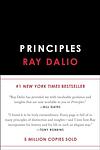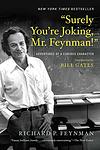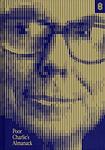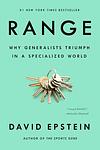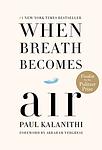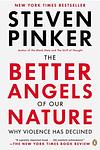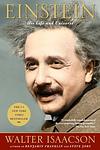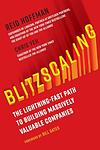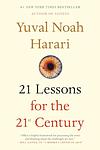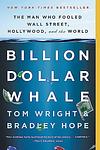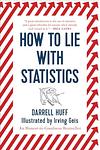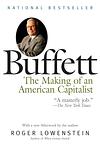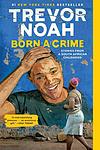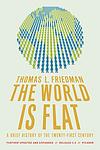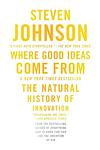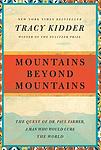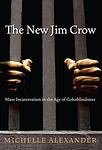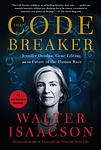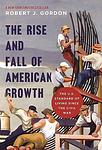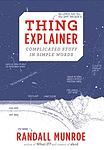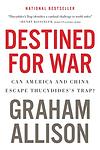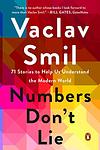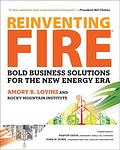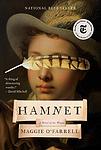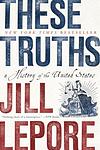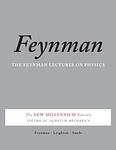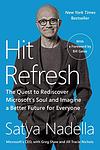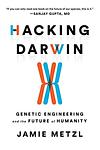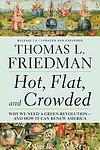Bill Gate's Book Recommendations
This is one of the 286 lists we use to generate our main The Greatest Books list.
-
Sapiens: A Brief History of Humankind by Yuval Noah Harari
This book provides a comprehensive exploration of the history of the human species, tracing back from the earliest forms of Homo Sapiens to the modern day. It delves into evolutionary biology, the development of cultures and societies, and the rise of major ideologies and technologies. The book also discusses the future of the species, posing thought-provoking questions about our roles and responsibilities in a rapidly changing world.
-
Principles by Ray Dalio
This book offers a deep dive into the core principles that the author, a successful investor and entrepreneur, has developed over his career to create unique results in both life and business. It is divided into two parts: the first explores the importance of having a clear set of principles to guide decision-making processes, while the second part focuses on the practical application of these principles in the realms of economics, investing, and management. The author emphasizes the value of radical transparency and open-mindedness as key strategies for achieving success. Through sharing his personal journey and the lessons he has learned, the book aims to provide readers with a framework for making better decisions, understanding and managing risks, and achieving their goals.
-
Thinking, Fast and Slow by Daniel Kahneman
The book delves into the two systems that drive the way we think—System 1, which is fast and intuitive, and System 2, which is slow and deliberate. The author, a Nobel laureate, explores how these systems shape our judgments and decision-making. He presents several groundbreaking experiments that have shaped our understanding of human thought, revealing where we can trust our intuitions and how we can tap into the benefits of slow thinking. The book also discusses how our cognitive biases often lead to errors in judgment and affect our decision-making processes.
-
Shoe Dog by Phil Knight
This memoir provides an intimate look into the early days and rise of a global sportswear giant, narrated by its founder. It chronicles the journey from selling shoes out of the trunk of a car to building an iconic brand that revolutionized the athletic footwear and apparel industry. The narrative delves into the trials, setbacks, and triumphs faced along the way, including financial struggles, legal battles, and personal challenges. Through perseverance, innovative marketing, and a commitment to product quality, the company emerged as a leader in its field, transforming the landscape of sports and fashion. The story is a testament to the power of vision, passion, and relentless pursuit of a dream.
-
Steve Jobs by Walter Isaacson
This biography provides an in-depth look at the life of the co-founder of Apple Inc., a visionary and creative genius who revolutionized several industries, from personal computing and animated movies to music, phones, tablet computing, and digital publishing. Drawing from over forty interviews with the subject himself, as well as interviews with more than a hundred family members, friends, adversaries, competitors, and colleagues, the book offers an exhaustive exploration of his intense personality and passionate drive. It delves into his early life, the founding of Apple in his parents' garage, and his rise to becoming one of the most admired creative entrepreneurs of the 20th century. Through his story, the biography not only sheds light on the innovations that have shaped modern technology but also on the qualities and imperfections that defined a man who was at once a brilliant innovator and a complex human being.
-
Mindset by Carol S. Dweck
This book explores the powerful concept of mindset, presenting the idea that the way individuals think about their abilities and potential fundamentally influences their success. It distinguishes between two types of mindsets: the fixed mindset, which assumes that our character, intelligence, and creative ability are static givens which we can't change in any meaningful way, and the growth mindset, which thrives on challenge and sees failure not as evidence of unintelligence but as a heartening springboard for growth and for stretching our existing abilities. Through analysis and real-life examples, the book demonstrates how the mindset we adopt not only profoundly affects our personal achievement but also has the potential to impact all areas of our lives, suggesting that by changing our mindset, we can significantly alter our life course.
-
"Surely You're Joking, Mr. Feynman!": Adventures of a Curious Character by Richard P. Feynman
The book is an autobiography of a Nobel Prize-winning physicist, filled with humorous and insightful anecdotes from his life. It highlights his adventures from his early years, working on the Manhattan Project, to his teaching years at Caltech. The book showcases his unconventional thought process, his insatiable curiosity, and his passion for science, painting a vivid picture of a man who never stopped questioning and learning.
-
The Black Swan by Nassim Nicholas Taleb
The book delves into the profound impact of highly improbable and unpredictable events that have massive consequences, which the author terms as "Black Swans." It challenges our understanding of the world by critiquing how we rely on simplistic models to predict the future, often overlooking the possibility of such rare events that can reshape our reality. Through a blend of philosophical insights and practical wisdom, the narrative encourages readers to embrace uncertainty and unpredictability, arguing that our ability to deal with Black Swans is more important than trying to predict them. The author's exploration spans across various domains, including finance, science, and history, illustrating how Black Swans have shaped the course of human events and urging a reevaluation of how we think about risk and reward in an inherently unpredictable world.
-
Poor Charlie's Almanack by Charlie Munger
This book is a compilation of wisdom and insights from one of the most successful investors and thinkers of our time. It gathers speeches, essays, and reflections, offering readers a deep dive into the philosophy of value investing and decision-making. Through its pages, the book emphasizes the importance of multidisciplinary learning, mental models, and the psychology of human misjudgment. It serves not only as a guide to better investment practices but also as a manual for living a more thoughtful and effective life. The teachings within are presented in an accessible manner, making complex ideas understandable and actionable for a wide audience, from seasoned investors to those just beginning to explore the intricacies of personal and professional development.
-
Outliers by Malcolm Gladwell
The book examines the factors that contribute to high levels of success. Through a compilation of anecdotes and analyses of various cultural phenomena, it argues that success is not simply a result of individual talent or intelligence, but rather the result of a combination of opportunities, hidden advantages, cultural legacies, and the amount of time spent practicing a specific task. The author challenges the traditional notion of the "self-made" individual by emphasizing the importance of external influences and timing, such as being born in a certain era or having access to specific resources, in shaping one's ability to achieve extraordinary accomplishments.
-
Range by David Epstein
This book challenges the conventional wisdom that early specialization is the only path to success, arguing instead for the value of broad experiences and experimentation. Drawing on a wide array of real-world examples and scientific research, it makes the case that individuals who embrace diverse interests and experiences are often more creative, more agile, and able to make connections their more specialized peers can't see. The narrative asserts that in a rapidly changing world, the ability to adapt and integrate information from multiple domains is not just an advantage but a necessity. Through compelling stories and data, the book encourages embracing a more versatile approach to learning and career development.
-
How To Change Your Mind: What The New Science Of Psychedelics Teaches Us About Consciousness, Dying, Addiction, Depression, And Transcendence by Michael Pollan
In "How To Change Your Mind," Michael Pollan explores the history, science, and potential therapeutic uses of psychedelic drugs such as LSD and psilocybin. He interviews researchers, therapists, and individuals who have undergone psychedelic experiences, and shares his own personal experiences with these substances. Pollan argues that psychedelics have the potential to unlock new understandings of consciousness, spirituality, and mental health, and could offer new treatments for addiction, depression, and end-of-life anxiety. He also explores the cultural and political factors that led to the demonization and criminalization of these substances, and advocates for a reevaluation of their legal status in order to facilitate further research and exploration.
-
The Three-Body Problem by Cixin Liu
The book is a science fiction novel that intertwines the cultural revolution of China with a complex narrative involving astrophysics, virtual reality, and alien contact. It follows a disillusioned scientist who, after suffering personal tragedy during the Cultural Revolution, sends a message into space, only to receive a response from an alien civilization on the brink of destruction. As the aliens plan their migration to Earth, a secret organization works to facilitate the invasion, while a disparate group of scientists and military personnel attempt to understand and prevent the impending extraterrestrial crisis. The novel grapples with themes of human nature, technological advancement, and the vast, often incomprehensible universe.
-
Loonshots by Safi Bahcall
This book explores the science of innovation, focusing on how small, seemingly insignificant ideas (loonshots) can lead to industry-changing breakthroughs. The author, a physicist and biotech entrepreneur, delves into the dynamics that allow these radical ideas to flourish, drawing on a range of historical and contemporary examples. He introduces the concept of phase transitions to explain how organizations can balance the need for innovation with the maintenance of their core operations. Through engaging storytelling and rigorous analysis, the book provides insights into how leaders and teams can nurture groundbreaking innovations while sustaining their growth and success.
-
The Ride Of A Lifetime by Robert Iger
This book offers an insightful look into the professional journey of one of the most successful CEOs in the entertainment industry, detailing his rise through the ranks to lead a major media conglomerate. Through personal anecdotes and reflections, the narrative delves into key leadership principles, the importance of innovation, and the necessity of integrity and fairness in business. The author shares behind-the-scenes stories of major acquisitions and transformations within the company, highlighting the challenges and triumphs encountered along the way. This memoir not only serves as a roadmap for aspiring leaders but also provides a fascinating glimpse into the inner workings of the entertainment world.
-
The Catcher in the Rye by J. D. Salinger
The novel follows the story of a teenager named Holden Caulfield, who has just been expelled from his prep school. The narrative unfolds over the course of three days, during which Holden experiences various forms of alienation and his mental state continues to unravel. He criticizes the adult world as "phony" and struggles with his own transition into adulthood. The book is a profound exploration of teenage rebellion, alienation, and the loss of innocence.
-
Guns, Germs, and Steel by Jared Diamond
The book is a comprehensive exploration of the different trajectories of human societies throughout history. It argues that environmental factors, rather than racial or cultural differences, are the primary reason why some societies developed more advanced technology and political systems. The author uses a multidisciplinary approach, drawing from fields such as geography, evolutionary biology, and linguistics, to support his thesis. The book covers a wide range of topics, including the domestication of plants and animals, the invention of writing, and the spread of diseases.
-
The Great Gatsby by F. Scott Fitzgerald
Set in the summer of 1922, the novel follows the life of a young and mysterious millionaire, his extravagant lifestyle in Long Island, and his obsessive love for a beautiful former debutante. As the story unfolds, the millionaire's dark secrets and the corrupt reality of the American dream during the Jazz Age are revealed. The narrative is a critique of the hedonistic excess and moral decay of the era, ultimately leading to tragic consequences.
-
When Breath Becomes Air by Paul Kalanithi
This poignant memoir is a reflection on life and death by a young neurosurgeon who is diagnosed with terminal lung cancer. He grapples with the role reversal from doctor to patient, and confronts the reality of his mortality. The narrative explores the intersection of medicine and philosophy, and the meaning of life when faced with death. Despite his deteriorating health, he continues to find joy in his relationships and work, leaving behind a powerful message about the value of every moment.
-
The Checklist Manifesto by Atul Gawande
This book explores the compelling simplicity and surprising effectiveness of checklists in reducing errors and enhancing efficiency across various fields, particularly in medicine and aviation. The author, a renowned surgeon, argues that despite the complexity of modern professional tasks, the adoption of basic checklists can significantly improve outcomes and ensure consistency in performance. Through a mix of anecdotes, research, and personal experience, the narrative convincingly demonstrates how this straightforward tool can manage complexity and harness human knowledge more effectively, ultimately saving lives and optimizing tasks in complex environments.
-
Why We Sleep by Matthew Walker
This book delves into the critical importance of sleep, exploring its profound impact on our health, brain function, and overall well-being. The author, a renowned sleep scientist, combines decades of research and clinical practice to debunk common myths about sleep and highlight how modern life disrupts our natural sleep patterns. Through a blend of scientific insights and practical advice, the book emphasizes the role of sleep in enhancing memory, mood, and energy levels, while also detailing the dire consequences of sleep deprivation on our physical and mental health. It serves as a comprehensive guide on how to improve sleep quality and, by extension, live a healthier, more fulfilling life.
-
Project Hail Mary by Andy Weir
A solitary astronaut awakens with amnesia aboard a spaceship, the last hope of a desperate Earth facing an extinction-level threat from a stellar phenomenon. Tasked with a critical scientific mission, he must recall his purpose and utilize his ingenuity to understand the alien environment he encounters, forging an unprecedented alliance with an extraterrestrial life form. Together, they embark on a high-stakes interstellar quest to save humanity and other civilizations by unraveling cosmic secrets and overcoming insurmountable odds. The narrative is a thrilling blend of science, survival, and friendship, showcasing the resilience of the human spirit when confronted with the vast unknown.
-
Homo Deus by Yuval Noah Harari
This book explores the future of humankind, building upon the foundation laid by its exploration of our past. It delves into the potential paths humanity might take as technological advancements and artificial intelligence begin to challenge the very essence of what it means to be human. The narrative posits that as we conquer famine, war, and plague, our focus shifts towards achieving happiness, immortality, and divinity, raising profound questions about our future roles and values in a world where machines and algorithms might outperform us in thinking, making decisions, and understanding the universe. Through a blend of philosophy, history, and future-gazing, the book invites readers to consider the implications of such a future, both exhilarating and daunting.
-
The Better Angels Of Our Nature by Steven Pinker
This book presents a comprehensive analysis of violence throughout human history, arguing that, contrary to popular belief, we are living in the most peaceful era ever. The author uses a wealth of data to demonstrate how the rates of violence, from homicide to war, have decreased over centuries due to various social, cultural, and political developments. By examining the forces he believes have led to this decline, such as the spread of government, trade, and the influence of enlightenment thinking, the book offers an optimistic view of humanity's ability to reduce violence through reason and empathy, suggesting that our better angels are indeed winning the battle against our inner demons.
-
Einstein by Walter Isaacson
This biography provides an in-depth look at the life of one of history's most brilliant minds, delving into not only his groundbreaking contributions to physics, including the theory of relativity, but also his personal life, political views, and philosophical beliefs. The author meticulously chronicles the journey of a patent clerk who evolved into a Nobel Prize-winning physicist, exploring how his rebellious nature, intellectual curiosity, and persistence in questioning established norms led to some of the most revolutionary scientific discoveries of the 20th century. Through a wealth of personal letters and interviews, the book paints a comprehensive picture of a man who, beyond his scientific genius, was deeply involved in social and political issues of his time, including Zionism and pacifism, showcasing his enduring impact on both science and society.
-
Factfulness by Hans Rosling
The book challenges common misconceptions about the state of the world, using a wealth of statistical data to argue that, contrary to popular belief, global living conditions are improving significantly. It introduces ten instincts that distort our perspective—from the fear instinct (which leads us to perceive the world as more frightening than it is) to the destiny instinct (which causes us to assume that the fates of populations are predetermined). The author, a renowned public health expert, encourages readers to adopt a "factful" mindset, which relies on data and evidence to create a more accurate understanding of the world, ultimately fostering a more positive and productive approach to global challenges.
-
The Martian by Andy Weir
A gripping tale of survival and resilience, this book follows the story of an astronaut left stranded on Mars by his crew who believed him dead after a fierce storm. With limited supplies, he must utilize his ingenuity, wit, and spirit to survive and signal to Earth that he is alive. The narrative is a thrilling testament to human willpower and the relentless fight for survival against all odds.
-
Blitzscaling by Reid Hoffman
This book explores the aggressive growth strategy known as "blitzscaling," which prioritizes speed over efficiency in an environment of uncertainty. It outlines how companies can scale at a dizzying pace to become market leaders, leveraging network effects and capitalizing on rapid technological changes. The strategy involves making calculated decisions that can often seem counterintuitive, such as focusing on rapid expansion over immediate profitability or perfecting the product. Through a series of case studies and insights from successful entrepreneurs, the book provides a roadmap for startups and established companies alike to dominate their markets by embracing risk, prioritizing speed, and continuously adapting to the evolving business landscape.
-
Measure What Matters by John Doerr
This book introduces the concept of Objectives and Key Results (OKRs), a goal-setting framework that has been instrumental in driving the success of high-profile technology companies and organizations. Through a series of case studies and personal insights, the text explores how setting clear, ambitious goals and aligning them with measurable outcomes can empower teams, foster innovation, and enable companies to achieve their most audacious objectives. The author, a renowned venture capitalist, shares his extensive experience and the lessons learned from industry leaders, providing readers with a practical guide to implementing OKRs in their own organizations to drive growth and operational excellence.
-
Enlightenment Now by Steven Pinker
The book presents a comprehensive case for optimism in the modern era, arguing that humanity has made significant progress in various aspects such as health, prosperity, safety, peace, knowledge, and happiness, largely due to the values of the Enlightenment—reason, science, humanism, and progress. The author challenges the pervasive sense of pessimism in contemporary discourse and defends the scientific mindset and rational thinking as the driving forces behind improvements in human well-being. By analyzing a wealth of data and trends, the book encourages readers to appreciate the progress achieved and to continue embracing the Enlightenment principles to address current challenges and further advance the human condition.
-
Moonwalking With Einstein by Joshua Foer
This book delves into the fascinating world of memory and the techniques that enable people to enhance it to extraordinary levels. Through a narrative that combines personal journey with scientific exploration, the author embarks on a quest to improve his own memory. Along the way, he encounters 'mental athletes' who compete in memory championships and learns ancient techniques that have been almost forgotten in today's digital age. The story culminates in the author's own participation in the U.S. Memory Championship, showcasing not only the potential of the human mind but also questioning our understanding of intelligence and memory. Through engaging storytelling, the book provides insights into the mechanisms of memory and suggests that with practice and the right techniques, anyone can improve their memory skills.
-
The Rational Optimist by Matt Ridley
This book presents an invigorating perspective on the evolution of human society through the lens of economic and cultural progress. It argues that, contrary to popular pessimism, life has been getting progressively better for most people due to the inherent human tendency to exchange and innovate. The author posits that this process of exchange and specialization has been the driving force behind the remarkable increases in prosperity and quality of life over the centuries. By examining historical trends and data, the narrative challenges the doom-and-gloom outlook, suggesting that rational optimism is not only justified but necessary for continued progress. The book encourages readers to embrace the potential for future advancements and the continued improvement of the human condition through the power of rational thought and optimistic outlook.
-
Play Nice But Win by Michael Dell
This book offers an insider's perspective on the high-stakes world of technology and business, chronicling the journey of a visionary entrepreneur who transformed a small startup from his dorm room into a global powerhouse. Through a blend of personal memoir and business strategy, the narrative delves into the challenges and triumphs faced in the competitive tech landscape, emphasizing the importance of innovation, leadership, and strategic decision-making. The author shares candid insights and behind-the-scenes stories of battles fought both in and out of the boardroom, advocating for a balanced approach to competition that combines fierce determination with ethical conduct. It serves as both an inspirational roadmap for aspiring entrepreneurs and a reflective look at the relentless pursuit of success in the ever-evolving tech industry.
-
Leonardo Da Vinci by Walter Isaacson
This biography delves into the life of one of history's most fascinating figures, a man whose curiosity and unparalleled genius spanned across various fields such as art, science, engineering, and anatomy. Through a meticulous examination of thousands of pages from his notebooks and the exploration of his famous artworks, the book paints a vivid picture of Leonardo da Vinci's relentless pursuit of knowledge and his extraordinary ability to observe the world in ways no one else did. The narrative not only celebrates his well-known masterpieces but also highlights his countless uncompleted projects and his unique approach to merging science and art, revealing the complexities and contradictions of a man who sought to understand the universe in all its facets.
-
Becoming Steve Jobs by Brent Schlender
This book offers a nuanced portrait of the iconic innovator Steve Jobs, delving into his evolution from a reckless upstart to a visionary leader who revolutionized the tech industry. Drawing from years of interviews and personal interactions, the narrative sheds light on Jobs's growth and maturity, both personally and professionally, challenging the simplistic caricature often depicted in media. It explores his deep relationships, his failures, and his ultimate successes, providing a comprehensive look at the man behind Apple's resurgence, emphasizing the complexity of his character and the transformative experiences that shaped his approach to business and creativity.
-
Evicted: Poverty and Profit in the American City by Matthew Desmond
This book provides an in-depth look at the housing crisis in America, focusing on eight families in Milwaukee who are struggling to keep a roof over their heads. The author explores the role of eviction in perpetuating poverty, illuminating the business of landlords and the harsh reality of tenants in impoverished neighborhoods. The book offers a close examination of the intersection between profit and poverty, revealing how both are intricately linked in the American housing market.
-
21 Lessons For The 21st Century by Yuval Noah Harari
This book navigates through the complexities and challenges of the 21st century, offering insightful analysis and thought-provoking lessons on various pressing issues such as technology, politics, religion, and education. The author delves into the impact of artificial intelligence and biotechnology, exploring how they are reshaping the world and questioning the future of humanity in this rapidly changing landscape. Through a series of compelling essays, the book encourages readers to reflect on the values, meaning, and personal engagement in a world full of noise and uncertainty, aiming to equip society with the understanding and wisdom to navigate the unknown future.
-
Bad Blood by John Carreyrou
This book delves into the riveting true story of a Silicon Valley startup that promised to revolutionize the medical industry with a groundbreaking device that could perform a full range of laboratory tests using just a few drops of blood. However, the company's charismatic founder's ambition and the immense pressure to succeed led to one of the most notorious cases of corporate fraud in recent history. Through extensive reporting and interviews, the narrative exposes how the company's misleading claims, toxic workplace culture, and unethical business practices put patients at risk, eventually leading to its dramatic downfall. The investigation into the company's practices not only captivated the nation but also raised critical questions about innovation, integrity, and regulation in the tech industry.
-
Behave by Robert Sapolsky
This book delves into the complex world of human behavior, exploring the intricate interplay of biology, psychology, and environment in shaping our actions. The author, a renowned neurobiologist and primatologist, takes readers on a journey from the neurochemical level, explaining how hormones and brain structure influence behavior, to the broader societal and evolutionary contexts that mold our actions. Through a multidisciplinary approach, the book examines why we behave the way we do, from acts of kindness to aggression, providing a comprehensive overview of the factors that drive human behavior.
-
Open by Andre Agassi
This autobiography provides a candid and introspective look into the life of one of tennis's most enigmatic figures, chronicling his journey from a child prodigy pushed into the sport by an overbearing father to becoming one of the game's greatest players. It delves into his struggles with fame, identity, and personal relationships, as well as his battles against injuries and his rivalry with other tennis legends. The memoir is remarkably open about his disdain for the sport that made him famous and his use of methamphetamine, which led to a controversial period in his career. It's a story of transformation and redemption, showcasing his evolution from a rebellious teenager to a philanthropic adult who finds true fulfillment in helping others, particularly through his educational charity work.
-
Educated by Tara Westover
In this memoir, a young woman recounts her journey from a sheltered and abusive childhood in a strict and isolated Idaho family to her pursuit of knowledge and education. Despite facing numerous obstacles, including her family's distrust of formal education, Tara Westover manages to escape her oppressive upbringing and eventually earns a PhD from Cambridge University. Through her compelling and thought-provoking narrative, she explores themes of identity, family, and the transformative power of education.
-
Billion Dollar Whale by Tom Wright, Bradley Hope
This book delves into the astonishing true story of one of the most audacious financial schemes in history, orchestrated by Jho Low, a financier who managed to siphon off billions of dollars from the Malaysian sovereign wealth fund, 1MDB. With a combination of charm, bold deception, and the complicity of high-profile individuals and institutions, Low financed an extravagant lifestyle and bankrolled Hollywood films, all while eluding global law enforcement. This gripping narrative exposes the intricate web of fraud, money laundering, and corruption, stretching across multiple countries and involving a cast of characters from the upper echelons of political and financial power, revealing the vulnerabilities and dark corners of the global financial system.
-
How To Lie With Statistics by Darrell Huff
This book serves as an eye-opening guide to the misuse of statistics in various contexts, illustrating how numbers can be manipulated to mislead or deceive. Through a series of engaging examples and clear explanations, it teaches readers to critically evaluate the statistical evidence presented to them in news reports, advertisements, and official statements. The author emphasizes the importance of understanding basic statistical concepts to avoid being duped by skewed data and graphs, making it an essential read for anyone looking to navigate the often misleading world of numerical information.
-
The Inner Game Of Tennis by W. Timothy Gallwey
This book delves into the psychological facets of playing tennis, focusing on how players can improve their game by developing their mental approach. It introduces the concept of the "inner game" which is the battle against one's own self-doubts, fears, and lapses in concentration, rather than the visible opponent across the net. Through a series of insightful lessons and practical techniques, the author guides readers on how to achieve a state of relaxed concentration, optimize their performance, and increase their enjoyment of the game. By applying these principles, players can overcome mental obstacles to unlock their full potential on the court.
-
Buffett by Roger Lowenstein
This book provides an in-depth look at the life and career of one of the most successful and respected investors in history. It chronicles his journey from a young boy fascinated by numbers to becoming the CEO of a multinational conglomerate, highlighting his unique investment strategies, personal philosophies, and the key decisions that led to his unparalleled success in the financial world. Through detailed research and interviews, the biography not only sheds light on his professional achievements but also delves into his personal life, revealing the principles and ethics that guide him both in business and in his philanthropic endeavors. This comprehensive portrait offers valuable insights into the mind of a financial genius, making it a must-read for anyone interested in investment, business, and the story of extraordinary achievement.
-
Cloud Atlas by David Mitchell
This novel is a unique blend of six different stories, each set in a different time and place, spanning from the 19th century South Pacific to a post-apocalyptic future. Each tale is written in a different style, reflecting the time and setting it represents, and they are all connected through shared themes and recurring motifs. The stories are nested within each other, with each interrupted by the next, only to be concluded in the second half of the book. The novel explores themes of predacity, civilization, reincarnation and the eternal recurrence of the same behaviors throughout history.
-
The Gene by Siddhartha Mukherjee
This book provides a comprehensive exploration of the history and science of genetics, tracing its development from the earliest experiments on pea plants to the cutting-edge advancements in gene editing technologies. Through a blend of scientific insights, historical narratives, and personal stories, the text delves into the complexities of heredity, the moral implications of genetic manipulation, and the potential future of human evolution. It aims to demystify the concept of the gene for a general audience, illustrating how these fundamental units of heredity influence not only physical traits and diseases but also contribute to our understanding of identity and kinship.
-
Team of Rivals: The Political Genius of Abraham Lincoln by Doris Kearns Goodwin
This book explores the political acumen of Abraham Lincoln, focusing on how he assembled his cabinet from political adversaries, many of whom initially dismissed him for his perceived lack of experience and ungainly appearance. The narrative delves into how Lincoln used his rivals' talents to navigate the tumultuous times of the Civil War, maintaining unity and leading the nation towards the abolition of slavery. It underscores Lincoln's extraordinary ability to turn rivals into allies, demonstrating his leadership and his profound impact on American history.
-
The Moment Of Lift by Melinda Gates
This book is a compelling call to action for global gender equality, weaving together personal anecdotes, rigorous research, and powerful stories of women from around the world. The author, a philanthropist deeply involved in global development, shares her journey of understanding the critical role that empowering women plays in overcoming poverty and achieving societal growth. Through her experiences and the initiatives of her foundation, she highlights how issues such as access to contraceptives, education, and equal participation in the workforce are pivotal in lifting communities out of poverty. The narrative is both an eye-opening account of women's struggles and a hopeful testament to the transformative power of lifting women up.
-
Born A Crime by Trevor Noah
"Born A Crime" is a captivating memoir that chronicles the life of Trevor Noah, a South African comedian and television host. Set during the apartheid era, the book explores Noah's experiences as a mixed-race child growing up in a society where interracial relationships were illegal. With humor and insight, Noah recounts his struggles with identity, poverty, and racism, while also highlighting the resilience and strength of his mother who played a pivotal role in his life. This thought-provoking memoir offers a compelling and personal perspective on race, family, and the power of laughter in the face of adversity.
-
Stranger in a Strange Land by Robert A. Heinlein
The novel follows the life of Valentine Michael Smith, a human who was raised on Mars and returns to Earth in early adulthood. Smith struggles to understand human culture, norms, and conventions, while also possessing extraordinary psychic abilities. As he navigates Earth society, he begins to question many of its institutions and values, ultimately creating his own religion to pass on the wisdom he gained on Mars. The book explores themes of freedom, self-reliance, and the nature of humanity, and is considered a classic of science fiction literature.
-
Seveneves by Neal Stephenson
In this science fiction epic, humanity faces an existential crisis when the moon suddenly explodes, triggering a catastrophic chain of environmental disasters on Earth. With only two years before the planet becomes uninhabitable, nations unite to launch a daring plan to preserve human life by sending a select group of survivors into orbit. The narrative spans thousands of years, chronicling the efforts of these initial survivors to maintain the human race in space, the political and social challenges they face, and the eventual attempt by their far-future descendants to return to a drastically changed Earth. The story is a sweeping examination of human resilience, ingenuity, and the enduring quest for survival against insurmountable odds.
-
The Emperor of All Maladies: A Biography of Cancer by Siddhartha Mukherjee
This book is a comprehensive history of cancer, its treatments, and the ongoing search for a cure. It presents an in-depth exploration of the disease from its first documented appearances thousands of years ago through the epic battles in the twentieth century to cure, control, and conquer it, to a radical new understanding of its essence. The book also discusses the politics of cancer research, the impact of patient activism, and the complex and often fraught relationships between researchers, oncologists, and patients.
-
Hillbilly Elegy by J. D. Vance
"Hillbilly Elegy" is a memoir that explores the author's personal journey from a troubled upbringing in a working-class Appalachian family to achieving success as a Yale Law School graduate. Through his own experiences, J. D. Vance delves into the challenges and complexities faced by the white working class in America, addressing issues such as poverty, addiction, and the cultural dynamics that shape their lives. This poignant and thought-provoking account offers a compassionate and insightful examination of social and economic struggles, while also reflecting on the importance of family, resilience, and the pursuit of the American Dream.
-
The World Is Flat by Thomas L. Friedman
This book presents a compelling analysis of globalization in the early 21st century, arguing that the world has become "flat" through technological and political changes that have removed barriers to international trade and communication. The author explores how these changes have allowed individuals and companies from all over the globe to compete and collaborate in ways that were previously impossible, fundamentally altering economies, societies, and the balance of power. Through a series of anecdotes and analyses, the book examines the forces flattening the world, the implications for governments, businesses, and individuals, and the challenges and opportunities presented by this new global landscape.
-
Tools And Weapons by Brad Smith
This book delves into the complex relationship between technology's rapid advancement and the societal, ethical, and legal challenges it brings. It explores how digital technology, while being a powerful tool for innovation and progress, also poses significant risks and responsibilities, particularly in areas such as privacy, cybersecurity, and digital surveillance. Through a series of insightful analyses and examples, the narrative underscores the urgent need for tech companies, policymakers, and individuals to work together in crafting regulations and solutions that balance technological growth with the protection of democratic values and human rights. The book serves as a call to action, emphasizing that the choices made today will shape the future of not just technology, but society as a whole.
-
Where Good Ideas Come From by Steven Johnson
This book explores the natural history of innovation, presenting a fascinating look at how good ideas evolve and the environments that foster their development. The author argues that certain patterns recur in spaces of creativity and innovation, such as the importance of networks, the value of the "adjacent possible," and the role of serendipity. Through a mix of historical anecdotes and scientific research, the book challenges the notion of the solitary genius, instead highlighting the collaborative webs and systems that contribute to breakthroughs. It offers insights into how individuals and organizations can cultivate the conditions most conducive to innovation.
-
Life 3.0 by Max Tegmark
This book explores the future of artificial intelligence (AI) and its impact on the fabric of human existence, proposing a framework for understanding the progression of life through the lens of technological evolution. It delves into the potential scenarios that could unfold as AI surpasses human intelligence, raising profound questions about consciousness, the role of humans in a world shared with advanced AI, and how society can navigate the ethical, political, and existential challenges this new era presents. The author encourages a proactive approach to designing and governing AI technologies, emphasizing the importance of aligning them with human values and interests to ensure a future where humanity can thrive alongside increasingly intelligent machines.
-
Abundance by Peter Diamandis
This book presents an optimistic vision of the future, arguing that technology and innovation have the potential to solve many of the world's most pressing problems, including scarcity of resources, energy, water, and food. The author posits that through the power of exponential technologies, DIY innovators, technophilanthropists, and the rising billion of the world's population, we are on the cusp of creating a world of abundance. The narrative challenges the prevailing pessimism of our times, offering a roadmap for leveraging advancements in areas such as artificial intelligence, robotics, and digital manufacturing to create a future where everyone has access to all they need.
-
The Road To Character by David Brooks
This book delves into the deeper values that should guide our lives, arguing that society places too much emphasis on external success and not enough on the inner virtues that make for a meaningful existence. Through the exploration of historical figures and personal experiences, the author presents a compelling case for rebalancing our priorities towards moral qualities such as kindness, bravery, and honesty. The narrative encourages readers to reflect on their own lives and consider how they might cultivate a deeper character, ultimately suggesting that the journey towards inner virtue is both challenging and essential for a fulfilled life.
-
Mountains Beyond Mountains: One doctor's quest to heal the world by Tracy Kidder
The book is a compelling narrative about a dedicated doctor who leaves behind his comfortable life in America to work in the poorest regions of Haiti. His mission is to combat diseases like tuberculosis and AIDS, which are rampant in these areas. Despite facing numerous challenges, including lack of resources and political instability, his relentless determination and commitment to his cause lead to significant improvements in healthcare for these underserved populations. The story is a testament to the power of one individual's unwavering commitment to making a difference in the world.
-
The New Jim Crow by Michelle Alexander
"The New Jim Crow" is a thought-provoking and eye-opening book that examines the deeply ingrained racial bias within the American criminal justice system. Drawing on extensive research and personal anecdotes, the author explores how the War on Drugs has disproportionately targeted and marginalized Black communities, leading to a modern-day system of racial control and oppression. This powerful critique challenges readers to confront the systemic racism that continues to perpetuate inequality and injustice in the United States.
-
Capital in the Twenty-First Century by Thomas Piketty
This book provides a comprehensive analysis of the dynamics of capital accumulation and distribution over the last few centuries. The author argues that the rate of capital return in developed countries is persistently greater than the rate of economic growth, leading to high levels of wealth inequality. The book further suggests that the level of income inequality is not primarily a result of differences in individual labor income but rather the result of differences in capital ownership and the income derived from it. The author proposes a global tax on wealth to prevent soaring inequality.
-
Leadership by Doris Kearns Goodwin
This book delves into the lives and leadership styles of four U.S. Presidents, exploring how their distinct backgrounds, personalities, and experiences shaped their approach to the challenges of their time. Through meticulous research and engaging storytelling, the author reveals how each president faced adversity, made critical decisions, and demonstrated resilience and moral leadership. By drawing parallels and contrasts among these leaders, the book offers insightful lessons on leadership that apply beyond the political arena, emphasizing the importance of empathy, humility, and perseverance. Through these historical narratives, the book provides a profound understanding of what it takes to lead effectively in times of crisis and change.
-
How Not To Be Wrong by Jordan Ellenberg
This book delves into the fascinating world of mathematics, revealing its hidden influence on our daily lives and decisions. Through engaging anecdotes and accessible explanations, it demonstrates how mathematical thinking can help us navigate various aspects of life more effectively, from politics and health to finance and even war. The author, a renowned mathematician, argues that understanding basic mathematical principles can empower us to make better decisions, avoid common pitfalls, and see the world more clearly. By blending humor, history, and practical advice, the book makes a compelling case for the importance of mathematical literacy in an increasingly complex world.
-
The Prize: The Epic Quest for Oil, Money, and Power by Daniel Yergin
"The Prize: The Epic Quest for Oil, Money, and Power" is a comprehensive history of the global oil industry, tracing its development from the drilling of the first well in Pennsylvania to the oil crisis of the 1970s and its aftermath. The book examines the key players, political conflicts, and technological advancements that have shaped the industry, and explores the profound impact of oil on the global economy and geopolitics. It also discusses the environmental and social challenges associated with oil production and consumption.
-
A Gentleman in Moscow by Amor Towles
The novel follows the life of Count Alexander Rostov, an aristocrat who is sentenced to house arrest in the Metropol, a grand hotel across the street from the Kremlin, by a Bolshevik tribunal during the early years of Soviet Russia. Despite the vast historical changes occurring outside the hotel's walls, the Count lives a life of intellectual exploration, emotional discovery, and surprising personal growth within the confines of the luxurious establishment. Over the decades, his reduced circumstances provide a lens through which to observe the tumultuous events of mid-20th century Russia, as he befriends staff and guests, raises a spirited young girl who comes into his care, and adapts to his new reality with grace and wit.
-
Why We're Polarized by Ezra Klein
This book delves into the roots and mechanisms of political polarization in the United States, exploring how human psychology, partisan identity, and systemic factors intertwine to deepen divisions within American society. It argues that polarization is not merely a result of ideological disagreements but is also driven by underlying social, economic, and media dynamics that amplify us-versus-them mentalities. Through a detailed examination of historical trends, political behaviors, and institutional incentives, the book offers insights into how polarization shapes American politics and suggests potential pathways toward a more unified political discourse.
-
Too Big To Fail by Andrew Ross Sorkin
This book provides a comprehensive account of the 2008 financial crisis, focusing on the events and decisions that led to the near-collapse of the global financial system. It delves into the intricate world of Wall Street and the key figures involved, from CEOs of major banks to government officials, offering a detailed behind-the-scenes look at the high-stakes negotiations and the blend of arrogance, greed, and desperation that fueled the crisis. Through exhaustive reporting, the narrative explores how the failure of one institution threatened to bring down the entire financial system, leading to controversial bailouts and sparking debates on moral hazard, regulation, and the concept of institutions being "too big to fail."
-
The Book Of Why by Judea Pearl, Dana Mackenzie
This book explores the science of cause and effect, offering a groundbreaking perspective on how humans can understand and manipulate the world around them. By introducing a new mathematical framework known as causal inference, the authors demonstrate how we can move beyond traditional statistical analysis to answer complex questions about cause and effect. Through engaging examples and accessible explanations, the book challenges readers to think critically about the data and correlations they encounter in daily life, ultimately empowering them with the tools to ask and answer the fundamental question of "why?" in a more rigorous and informed manner.
-
Business Adventures by John Brooks
This book is a collection of twelve insightful tales from the corporate world, each exploring different facets of business life and the inherent challenges, successes, and failures. Through a series of engaging narratives, the reader is taken on a journey through major events and decisions that have shaped the landscape of American business. From the dramatic rise and fall of the Ford Motor Company's Edsel, to the intricacies of the stock market and the unexpected outcomes of corporate strategies, the book offers a deep dive into the complexities of business and the human elements that drive it. Its timeless lessons and the author's keen observations make it a must-read for anyone interested in understanding the dynamics of business and the factors that contribute to success and failure in the corporate world.
-
The Code Breaker by Walter Isaacson
This book delves into the life and groundbreaking work of Jennifer Doudna, a biochemist who played a pivotal role in the development of CRISPR, a revolutionary gene-editing technology. It chronicles her journey from her early days of fascination with the structure of RNA to her Nobel Prize-winning discovery that has opened new frontiers in genetic engineering. Through detailed storytelling, the narrative explores the ethical dilemmas and potential implications of gene editing, while also highlighting the collaborative and competitive world of scientific research. The book not only celebrates a monumental achievement in biotechnology but also prompts readers to ponder the future of human evolution.
-
Why Nations Fail by Daron Acemoğlu, James A. Robinson
This book delves into the origins of power, prosperity, and poverty, arguing that the fate of nations is determined not by geography, culture, or ignorance, but rather by the institutions that shape economic incentives and political power. It contrasts inclusive institutions, which enable and encourage participation by the great mass of people in economic activities that make the best use of their talents and skills, with extractive institutions, which are designed to extract incomes and wealth from one subset of society to benefit a different subset. Through a wide array of historical examples and analysis, the authors demonstrate how the interplay between these institutions has led to divergent paths of development among nations, suggesting that those with inclusive institutions tend to enjoy greater prosperity and success.
-
The Bully Pulpit: Theodore Roosevelt, William Howard Taft, And The Golden Age Of Journalism by Doris Kearns Goodwin
This historical work delves into the vibrant era of early 20th-century America, exploring the close friendship and eventual political rivalry between two presidents, Theodore Roosevelt and William Howard Taft. It also highlights the crucial role of muckraking journalists who, with the support of Roosevelt's bully pulpit, exposed corruption and galvanized public opinion. The narrative weaves together the personal and political dynamics that shaped the Progressive Era, showcasing how these leaders and the press collectively brought about significant reforms and forever transformed the American political landscape.
-
The Hunger Games by Suzanne Collins
Set in a dystopian future, the novel revolves around a teenager named Katniss Everdeen, who lives in a post-apocalyptic nation where the government, in order to maintain control, forces each of its twelve districts to send a boy and girl to participate in a televised annual event. This event, known as the Hunger Games, is a fight to the death. When Katniss's younger sister is selected to participate, Katniss volunteers to take her place. The book follows her struggle for survival in the cruel game, against the backdrop of a brewing rebellion against the oppressive regime.
-
The Spy And The Traitor by Ben Macintyre
This gripping non-fiction narrative delves into the heart of the Cold War, recounting the incredible true story of Oleg Gordievsky, a high-ranking KGB officer who became the most valuable double agent for the British MI6. The book masterfully chronicles Gordievsky's secret work, which significantly altered the course of international relations, and the harrowing operation to exfiltrate him from the Soviet Union after his cover was blown. It's a tale of espionage, bravery, and betrayal, showcasing the complex moral decisions involved in the shadowy world of intelligence and counterintelligence, and highlighting the personal sacrifices made in the name of peace and security.
-
The Sixth Extinction: An Unnatural History by Elizabeth Kolbert
The book explores the concept of the sixth extinction, suggesting that we are currently in the midst of it due to human activity. By examining previous mass extinctions and the current rapid loss of species, the author argues that humans are causing a mass extinction event through climate change, habitat destruction, and spreading of non-native species. The book offers a sobering look at the impact of human behavior on the natural world, emphasizing the urgency of addressing these environmental issues.
-
Stress Test by Timothy F. Geithner
This book provides an insider's perspective on the financial crisis that shook the global economy in the late 2000s. Written by a key figure in the U.S. government's response to the meltdown, it details the challenges and critical decisions faced by policymakers as they navigated through unprecedented economic turmoil. The narrative delves into the complexities of the financial system, the implementation of controversial measures to stabilize the economy, and the personal and professional trials encountered along the way. Through a blend of memoir and economic analysis, the author offers a detailed account of his role in steering the United States away from potential disaster, providing valuable insights into the mechanics of financial crises and the intricacies of governmental intervention.
-
The Box by Marc Levinson
This book provides a comprehensive history of the shipping container and its monumental impact on global trade and the economy. It delves into how a simple, standardized box revolutionized transportation and logistics, making it vastly more efficient and cost-effective. The narrative explores the container's inception, the challenges it overcame, and how it transformed ports, shipping industries, and even entire economies around the world. By focusing on this seemingly mundane object, the book uncovers the profound effects it has had on globalization, reshaping how goods are moved and traded on an international scale.
-
The Rise And Fall Of American Growth by Robert J. Gordon
This book provides a comprehensive analysis of the unprecedented economic growth in the United States from the late 19th century into the early 21st century, arguing that the period from 1870 to 1970 was a unique era of technological innovation that dramatically transformed living standards. The author contends that the pace of growth and innovation has significantly slowed since the 1970s, and the rapid improvements in quality of life experienced during the earlier period are unlikely to be replicated due to various headwinds, including demographic shifts, rising inequality, and environmental constraints. Through a detailed examination of economic data and historical trends, the book challenges the assumption that future technological advances will continue to drive high levels of economic growth and societal progress.
-
The Signal And The Noise by Nate Silver
This book explores the world of prediction, delving into how we can distinguish a true signal from a universe of noisy data. Through a series of engaging case studies—from baseball, to weather forecasting, to the stock market—the author demonstrates the art and science of predictive analytics. He argues that while our predictive capabilities are far from perfect, by understanding the inherent uncertainties and applying statistical models wisely, we can improve our ability to forecast future events. The book emphasizes the importance of thinking probabilistically and recognizing the limitations of our predictions in an increasingly complex world.
-
Stuff Matters: The Strange Stories Of The Marvellous Materials That Shape Our Man Made World by Mark Miodownik
In this captivating book, the author explores the fascinating world of materials that surround us, revealing their hidden stories and remarkable properties. From the glass in our windows to the concrete in our buildings, Miodownik takes readers on a journey through the history, science, and cultural significance of everyday materials. With a blend of personal anecdotes, scientific explanations, and historical context, he showcases the marvels of materials and their impact on our lives, ultimately highlighting the beauty and complexity of the man-made world we inhabit.
-
The Diary of a Young Girl by Anne Frank
This book is a real-life account of a young Jewish girl hiding from the Nazis during World War II, written in diary format. The girl and her family are forced to live in a secret annex in Amsterdam for two years, during which she writes about her experiences, fears, dreams, and the onset of adolescence. The diary provides a poignant and deeply personal insight into the horrors of the Holocaust, making it a powerful testament to the human spirit.
-
Thing Explainer by Randall Munroe
This book takes a unique approach to explaining complex scientific concepts, using only the thousand most common words in the English language. Through detailed diagrams and simple language, it breaks down subjects ranging from cells and the solar system to the workings of modern technology. The author, known for his ability to make science accessible and entertaining, provides readers with a fresh perspective on the world around them, making even the most complicated topics understandable to those without a background in science. This innovative format encourages curiosity and learning, making it a fascinating read for anyone looking to deepen their understanding of how things work.
-
Destined For War by Graham Allison
This book examines the looming possibility of conflict between the United States and China through the lens of the "Thucydides's Trap," a term coined by the author to describe the inevitable tensions and potential wars that occur when a rising power threatens to displace an existing great power. Drawing from historical examples, the book explores how this dynamic has led to war in 12 out of 16 past cases and delves into the specific challenges and strategic decisions facing both the U.S. and China. It offers a detailed analysis of the military, economic, and political factors at play, while also proposing paths to avoid conflict and maintain global stability. Through a blend of historical insight and contemporary analysis, the book presents a compelling case for the two powers to navigate this dangerous period with caution and strategic foresight.
-
The Splendid And The Vile by Erik Larson
This book offers a gripping narrative of leadership and resilience during one of the most pivotal periods in history, focusing on the first year of Winston Churchill’s prime ministership. It delves into how Churchill, through his indomitable spirit and powerful oratory, navigated the United Kingdom through the darkest days of World War II, particularly during the Blitz when Britain faced relentless bombing by Nazi Germany. Drawing from diaries, original archival documents, and once-secret intelligence reports, the narrative not only highlights Churchill’s political and military strategies but also provides intimate glimpses into his personal life, the challenges faced by his family, and the lives of ordinary British citizens. The book paints a vivid picture of a time when the fate of the world hung in the balance, showcasing the blend of courage, cunning, and emotional intelligence that defined Churchill’s leadership.
-
Behind the Beautiful Forevers: Life, Death, and Hope in a Mumbai Undercity by Katherine Boo
This book is a gripping narrative that provides an in-depth look into the lives of residents in a Mumbai slum, focusing on their struggles and aspirations. The author paints a vivid picture of the harsh realities of poverty, corruption, and inequality, while also highlighting the resilience and hope of the inhabitants. The narrative is a powerful exploration of the complexities of modern India, revealing the stark contrast between the country's booming economy and the grim living conditions of its underprivileged citizens.
-
Numbers Don't Lie by Vaclav Smil
In "Numbers Don't Lie," the author presents a compelling exploration of the essential statistics and facts that shape our understanding of the modern world. Through a series of insightful essays, the book delves into a wide range of topics, from energy and transportation to food production and environmental challenges. By analyzing data and debunking common misconceptions, the work offers readers a nuanced perspective on the complexities of technological advancement and its impacts on society. The author's rigorous approach to quantifying human progress and setbacks encourages a deeper appreciation for the role of empirical evidence in public discourse, making it a thought-provoking read for anyone interested in the interplay between science, technology, and culture.
-
Reinventing Fire by Amory Lovins
This book presents a groundbreaking roadmap for transitioning to a cleaner, more sustainable energy future by 2050, without relying on coal, oil, or nuclear power. It argues that through the innovative use of technology, design, and policy changes, society can achieve significant energy savings, enhance economic growth, and reduce reliance on fossil fuels, all while avoiding the need for new nuclear power plants. The author, a renowned energy strategist, combines meticulous research with practical insights, demonstrating how businesses and governments can capitalize on the economic opportunities presented by this transition to a low-carbon economy. The book is a compelling call to action, offering a visionary yet feasible plan for eliminating dependence on nonrenewable energy sources and reinventing how we produce and consume energy.
-
Hamnet by Maggie O'Farrell
"Hamnet" is a deeply moving and beautifully written historical novel that reimagines the life of a young boy, Hamnet, who is the son of a glovemaker in Stratford-upon-Avon. The boy tragically dies at the age of 11, which leaves a profound impact on his family, particularly his father, who is inspired to write one of the world's most famous plays. The narrative alternates between the time leading up to Hamnet's death and the aftermath, providing an intimate portrait of grief, love, and the power of art.
-
Life Is What You Make It by Peter Buffett
This book is a compelling exploration of personal philosophy and the quest for self-fulfillment. Through the lens of the author's own life experiences, including growing up as the son of a renowned investor, it challenges readers to define success on their own terms. Emphasizing values such as integrity, responsibility, and the importance of forging one's path, the narrative encourages a life lived according to personal passions and convictions, rather than societal expectations or the pursuit of material wealth. It's an inspirational guide that offers insights into making life choices that are aligned with one's true self, highlighting the belief that the most valuable currency is the impact we have on others and the world around us.
-
These Truths by Jill Lepore
This book offers a sweeping exploration of the history of the United States, from its earliest days to the present, through the lens of the ideals set forth in the Declaration of Independence: life, liberty, and the pursuit of happiness. The narrative delves into the contradictions between these founding principles and the realities of American history, including issues of racism, inequality, and political division. By examining the stories of both well-known and obscure individuals, the book presents a comprehensive and critical examination of the American experiment in democracy, its achievements, its failures, and its ongoing challenges. Through meticulous research and engaging storytelling, it invites readers to reflect on the nation's past and consider the path forward.
-
Collapse by Jared Diamond
"Collapse" is an exploration of why certain societies throughout history have thrived while others have deteriorated and collapsed. The book delves into environmental problems, climate change, rapid population growth, and unwise political decisions as factors that contribute to the downfall of a civilization. The author uses examples from history such as the Mayans, the Vikings in Greenland, and modern examples like Rwanda and Haiti, to illustrate his points. It serves as both a historical analysis and a warning for modern societies to learn from the past in order to avoid a similar fate.
-
The Feynman Lectures On Physics, Vol. Ii by Richard P. Feynman
This book is a comprehensive guide to electromagnetism, quantum mechanics, and the relationship between light and matter, based on a series of lectures designed to provide undergraduate students with a deep understanding of physics. The text combines rigorous mathematical descriptions with intuitive explanations, allowing readers to grasp complex concepts in a clear and accessible way. Through engaging examples and insightful discussions, it encourages students to think like physicists, developing a solid foundation in the principles that underlie modern physics while fostering an appreciation for the beauty and interconnectedness of the natural world.
-
Hit Refresh by Satya Nadella
This book provides an insightful look into the transformative journey of a global technology company under the leadership of its CEO, who took the helm with the vision of reinvigorating its culture and innovation. It delves into the personal and professional ethos of the CEO, emphasizing empathy, collaboration, and the pursuit of cutting-edge technology to solve some of the world's most challenging problems. Through a narrative that intertwines the executive's personal experiences with his professional endeavors, the book explores the importance of leadership that is adaptable, forward-thinking, and grounded in a deep understanding of human values, aiming to inspire current and future leaders to 'hit refresh' on their organizations and themselves.
-
This Time Is Different by Carmen M. Reinhart, Kenneth S. Rogoff
This book provides a comprehensive analysis of financial crises over the last eight centuries, examining the patterns and triggers of various economic downturns, from government defaults to banking panics. Through a meticulous compilation of historical data, the authors debunk the common belief that modern finance has made such crises obsolete, illustrating instead how similar patterns of excessive debt accumulation have consistently led to financial collapses. The work emphasizes the recurring theme that, despite technological advances and changes in financial systems, the belief that "this time is different" remains a dangerous illusion, often preceding the worst financial collapses.
-
Hacking Darwin by Jamie Metzl
This book explores the groundbreaking and rapidly advancing field of genetic engineering, focusing on how technologies like CRISPR are paving the way for human genetic enhancement and the potential eradication of hereditary diseases. It delves into the ethical, scientific, and political implications of gene editing, presenting a future where humanity has the tools to direct its own evolution. The author argues for the establishment of global standards to guide this powerful technology, emphasizing the need for a balanced approach that harnesses genetic engineering's benefits while mitigating its risks. Through a mix of scientific explanation, speculative future scenarios, and policy advocacy, the book aims to inform and prepare readers for a new era in human history.
-
Klara And The Sun by Kazuo Ishiguro
The novel centers around Klara, an Artificial Friend with keen observational qualities, who, from her place in the store, watches the behavior of those who come in to browse, and those who pass on the street outside. She remains hopeful that a customer will soon choose her, but when the possibility emerges that her circumstances may change forever, Klara is warned not to invest too much in the promises of humans. Set in a dystopian future, the story explores complex themes such as the nature of love, the ethics of artificial intelligence, and what it truly means to be human, all through the eyes of an AI protagonist yearning to understand the people she is meant to serve.
-
Hot, Flat, And Crowded by Thomas L. Friedman
This book delves into the complex interplay between global warming, globalization, and population growth, arguing that the convergence of these three forces has created a world that is 'hot, flat, and crowded.' The author emphasizes the urgent need for a green revolution, advocating for the United States to lead the way in adopting more sustainable energy practices and technologies. Through a mix of reporting, analysis, and advocacy, the book presents a compelling case for how embracing green energy not only addresses environmental challenges but also can drive economic growth and maintain the country's competitive edge in the global market.
-
The Sympathizer by Viet Thanh Nguyen
"The Sympathizer" is a gripping spy novel set during the Vietnam War. The protagonist is a half-French, half-Vietnamese army captain who is a communist double agent. After the Fall of Saigon, he moves to America with other South Vietnamese refugees and struggles to reconcile his dual loyalties as he continues to spy on his fellow countrymen in exile. The novel explores themes of identity, war, and politics, while providing a unique perspective on the Vietnam War and its aftermath.
This list has a weight of 50%. To learn more about what this means please visit the Rankings page.
Here is a list of what is decreasing the importance of this list:
- Voters: 1 person voted
If you think this is incorrect please e-mail us at [email protected].

